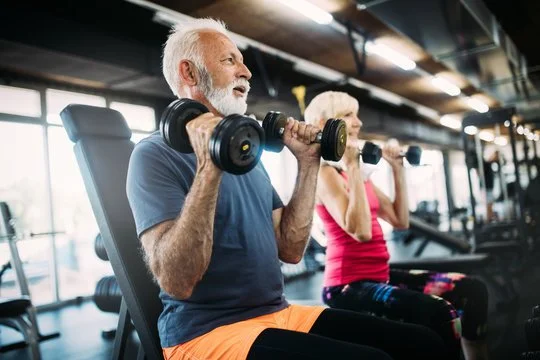Exercise and Aging
The Importance of Exercise for Longevity and Healthspan
We're all familiar with the common advice that exercise is vital for our wellbeing. But have you ever wondered exactly why physical activity is so crucial, and what type of exercise delivers optimal health benefits? Recent scientific research has provided illuminating answers to these questions.
A study published in the American Journal of Medicine in 2014, titled "Muscle Mass Index as a Predictor of Longevity in Older Adults," tracked 3,649 older participants (men over 55 and women over 65) for eight years. The findings revealed that individuals with the highest muscle mass had a strikingly lower all-cause mortality rate – 30% to 40% lower than those in the bottom 50% for muscle mass. Additionally, the researchers observed a strong correlation between higher muscle mass and lower levels of insulin and A1C (a measure of average blood sugar levels). The reduced mortality risk in the high muscle mass group was attributed to their better metabolic health, as elevated blood sugar can contribute to numerous chronic conditions like diabetes, obesity, cardiovascular disease, cancer, stroke, and dementia.
Insulin resistance, a key factor in elevated blood sugar, has also been linked to the suppression of autophagy – the natural process by which cells break down and recycle old components to operate more efficiently.
The renowned Trøndelag Health Study (HUNT Study) from Norway, one of the largest health studies ever conducted, uncovered compelling evidence for the benefits of high-intensity resistance training (HIT). A single session of HIT was found to decrease the risk of heart disease-related death by 40% to 50%, while also significantly enhancing brain plasticity compared to moderate exercise.
Further research published in Cancer Cell demonstrated that exercise can promote anti-tumor immunity in pancreatic cancer, one of the deadliest forms of cancer.
In the realm of mental health, a study in the British Medical Journal revealed that exercise is more effective than antidepressant medication in alleviating depression.
The National Institutes of Health (NIH) has identified at least 35 chronic diseases that can be prevented or delayed through regular exercise. Another NIH study discovered that a single session of resistance training can rapidly clear senescent (non-functional) cells from muscles – a process known as autophagy.
These findings are just a small sample of the vast scientific literature highlighting the benefits of exercise for increasing our "healthspan" – the number of years we live in good health. After all, most people don't want to merely extend their lifespan if it means spending their later years in a nursing home or suffering from debilitating conditions. Exercise and maintaining muscle mass can help ensure a longer, more vibrant healthspan by preventing the frailty that often accompanies aging. For example, falls resulting in hip fractures are a leading cause of death among the elderly, a risk that can be mitigated by maintaining a healthy muscle mass.
As we enter our 30s, muscle loss (known as sarcopenia) begins to accelerate with each passing decade, taking a devastating toll on our health if left unchecked. So, what is the most effective form of exercise for preserving muscle mass and avoiding sarcopenia? The research cited above points to high-intensity resistance training (HIT) as the answer.
HIT, a form of strength training popularized in the 1970s by Arthur Jones, the founder of Nautilus, focuses on performing quality weight training repetitions to the point of momentary muscular failure. One excellent resource on this topic is "The Slowburn Fitness Revolution," which outlines a program for increasing muscle mass with just two 30-minute sessions per week.
Investing a mere hour per week into maintaining your muscle mass is a small price to pay for a longer, healthier life. The scientific evidence is clear: Regular exercise, particularly high-intensity resistance training, is paramount for preserving optimal health and longevity as we age.



